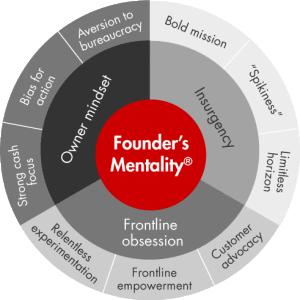This Founder’s Mentality ensures Long-Term Growth for your Business
Long-term growth for his or her business is every founder’s dream.
They all envision a future where their business is achieving its objective – changing the world and their customers’ lives for the better.
While visualising how your business’s future will look like is desirable, having knowledge of real-world challenges of the business environment is mandatory.
Many founders and entrepreneurs starting out their businesses are asking themselves this question:
What is the success rate of businesses?
Statistics say the following:
- 20% of new businesses survive past their first year of operation;
- Around 50% of all businesses no longer exist after five years;
- 1/3 make it past their 10th anniversary (source: usatoday.com)
- 1 in 9 companies sustain more than a minimum level of profitable growth over 10 years (source: Bain&Company).
These low numbers paint a rather gloomy picture.
But don’t let them discourage you!
Research has found the secret behind the successful long-term growth of the 1 in 9 companies mentioned above and this article helps you discover it.
In 2016, Bain & Company, a management consulting firm published its research, which tackled the subject of business crises.
The findings are detailed in How to overcome the predictable crises of growth: The Founder’s Mentality authored by Bain strategists, Chris Zook and James Allen.
The Founder’s Mentality – the study
Bain & Company’s 18-year study looked for answers related to the burning question of
Why are there so little companies capable of sustained growth over a long period of time?
The researchers broke this big question into three more detailed questions. They are:
- What are the primary barriers and challenges that companies face today in their pursuit of sustained and profitable growth?
- What distinguishes the companies that are able to anticipate and address these challenges most successfully from those that fail to achieve their goals?
- Are successful companies set up internally in a fundamentally different way, which allows them to react to challenges and adapt to opportunities better and faster than those that fall short?
The Founder’s Mentality – Key Findings
The results are surprising, but don’t take our word for it: let’s dig in a little deeper.
The Founder’s Mentality Study drew upon a wide range of sources from large, quantitative surveys, large analyses using Bain & Company databases, and an extensive number of discussions, interviews and case studies. You can read about the study’s resources in detail on FoundersMentality.com.
The Bad
Here’s what the researchers have found:
1. 85% of executives say that businesses experiment slow or no growth due to internal factors;
2. The internal barriers to growth cited by executives are:
- revenues growing faster than talent,
- increasing distance from the customer with growth,
- complexity of decision making slowing the company down,
- inability to choose focus and direction,
- mobilizing resources with difficulty
3. There are 3 challenges faced by companies during the course of their life cycle:
- Overload – which typically occurs during a rapid scale-up period (five to ten times);
- Stall-out – when the growth engine in a mature company loses momentum;
- Free fall – when a company’s business model no longer works and performance declines sharply.
The study’s conclusion reveals a paradox of growth:
Growth creates complexity, and complexity is the silent killer of growth.
The Good
All hope is not lost because researchers found the common thread that runs through all businesses, which enjoyed long-term growth.
The companies which surmount these challenges of growth and demonstrate higher levels of business and financial performance have maintained attitudes and behaviours most commonly found in young companies run by strong, successful founders.
The researchers analysed these companies and observed a series of traits related to the ability of them to sustain long-term growth.
They call them Founder’s Mentality.

image source: foundersmentality.com
Here are the main traits of the Founder’s Mentality as depicted by the study:
1. A sense of insurgent mission
The insurgent companies are characterized by a sense of higher purpose, a long-term horizon, and a few spikes in capabilities and assets that make them special and are the centrepiece of their business model.
2. An obsession with the front line
This trait is exhibited by companies characterized by an intellectual curiosity about every detail of the customer experience and of how everything in the business works. Executives use instincts formed at the ground level to make every decision. Frontline employees are empowered and are the heroes of the business; and the customer voice is central to all decisions.
3. An owner’s mindset
The leadership is characterized by a powerful sense of responsibility for employees, customers, products and decisions; an antipathy to bureaucracy; and a bias toward speed in decisions and actions.
Companies that exhibit these traits have sustained long-term growth because:
- They move and adapt faster;
- They are more open-minded;
- Anticipate and adapt to the future.
Three categories of the Founder’s Mentality: Which one are you?

image source: supershazzer.com
The Insurgents
- Bold mission
The team is at war against their industry on behalf of underserved customers. The bold mission means to redefine their industry on behalf of underserved or new and emerging customers.
- Spiky capabilities
The company is world class at those things that really matter for customers and decidedly average at the rest.
Competitiveness comes from sticking to what the company is great at and focusing resources ruthlessly on these few spikey capabilities.
- Limitless horizon
The leaders refuse to be defined by or constrained within the industry in which they first competed. They are constantly pushing against the edges of business definition, redefining the markets in which they compete.

image source: hooklineandclincher.in
The Frontline Obsession
- Customer advocacy
These companies constantly translate strategy and organizational decisions into frontline routines and behaviours in order to serve customers better and earn customer advocacy and loyalty.
- Frontline empowerment
The leaders obsess about the key players in their organization who deliver the value to customers and ensure that these people are the “heroes.”
Leaders do not allow organizational layers or complexity to distract them from this focus on the talent that really matters. Frontline empowerment is a top priority—these companies give their people the authority and resources they need to do what it takes to serve customers better.
- Relentless experimentation
Hundreds of experiments by customer-focused, empowered employees continually innovating and working with their customers to devise new solutions, better service and better products.

image source: canon-europe.com
The Owner Mindset
- Strong cash focus
Leaders are obsessed with the cash generated by the business, which demands they constantly monitor the gross margin of the business and the SG&A line. They constantly reallocate spending to the best use, never allowing resources to be hoarded.
- Bias for action and speed
Leaders of insurgent companies welcome conflict—if quickly resolved—as a path to the best outcomes for the company and its customers. But they won’t tolerate anyone using conflict as an excuse for inaction or to slow the company’s metabolism.
- Aversion to bureaucracy
While systems, processes and procedures become increasingly necessary as a company grows, insurgent leaders seek to balance that need for professionalization by making heroes of those individuals who don’t hesitate to buck the systems if it means doing the right thing for the customer. Leaders accept the occasional chaos that may result as the cost of maintaining that balance.
Are you curious about which Founder’s Mentality traits are strong within your company?
Take this diagnostic survey!
Top 20 business people to watch for in 2017
Each one of us needs to be inspired, to meet and read about inspirational people and success stories that truly show us that the sky is the limit. We compiled of list of great entrepreneurs, social media influencers, both men and women, that we believe deserve a look over their careers so far and that will still be a great inspiration in the years to come.
Neil Patel – an internet marketer and conversion expert, best known as the founder of Crazy Egg, Quick Sprout, and KISSMetrics. Recognized as a top 100 entrepreneur under the age of 30 by President Obama, Patel is also a regular, respected contributor for publications such as Inc., Fast Company, Forbes, Entrepreneur.com and TechCrunch. He helps companies like Amazon, NBC, GM, HP and Viacom grow their revenue.
John Rampton is a serial entrepreneur, connector, and the founder of Due.com. Rampton has hailed as No. 3 of the Top 50 Global Online Influencers and one of the Top 10 Most Influential PPC Experts in the World for 3 years running. Time Magazine recognized John as a motivations speaker that helps people find a “Sense of Meaning” in their lives. He currently advises several companies in the bay area. John loves helping others succeed online. It’s all about helping and giving back. It brings me joy in my life.
Chris Stoikos is best known for his hilarious viral videos, which generated 130M views and $10.5M in sales in the past year alone as part of his venture Dollar Beard Club. Stoikos has also appeared on NBC’s Shark Tank and generated millions in revenue for various product launches. is a highly regarded serial entrepreneur with two successful exits under his belt. He is an expert at creating and organizing dynamic teams that can execute business ideas quickly and effectively, and set them up to be self-sustaining organizations.
Ann Handley has been named by “Forbes” as the “Most Influential Woman in Social Media” and one of the Top 20 Women Bloggers. She is the chief content officer of MarketingProfs, a training company that empowers marketers internationally with the skills they need to drive success at their companies, and her book “Everybody Writes” is a Wall Street Journal bestseller. She is also the co-author of the best-selling book on content marketing, “Content Rules: How to Create Killer Blogs, Podcasts, Videos, Ebooks, Webinars (and More) That Engage Customers and Ignite Your Business.”
Moreover, a pioneer in digital marketing, Ann is the co-founder of ClickZ.com, which was one of the first sources of digital marketing news and commentary.
Shradha Agarwal co-started Context Media with a goal to help patients with chronic diseases better manage their health. She is now reaching more that 6+ million patients a month. Shradha co-founded JumpStart Ventures in 2011 to fund other passionate entrepreneurs who are executing ambitious solutions in healthcare, education and media communications, and has since backed more than 40 companies with over $10 million in venture investments. She mentors entrepreneurs at Techstars, Impact Engine & Blueprint Health, but is equally invested in the venture philanthropy model for scaling nonprofit solutions through SVP Chicago and The Chicago Public Education Fund. She serves on the boards of OneGoal and Chicago Children’s Choir and spiritedly supports youth education, women leadership, and civic engagement. The CEC recently honored the two ContextMedia co-founders with the “2015 Chicagoness Award” for their deep commitment to developing the city’s ecosystem. Agarwal was honored as a Champion of Change by the White House, recognized as Best Female Founder at the United Nations, and won a Moxie Award as “Tech Woman of the Year” in Chicago.
Anthony Smith is Founder and CEO of Insightly, a San Francisco-based company that provides customer relationship management (CRM) cloud-based software to more than 1.2 million customers in 200 countries. After identifying a market need for a CRM solution for small businesses, Anthony built the first version of Insightly himself, using his previous experience of designing, constructing, and implementing CRM software for enterprises.
Julia Taylor Cheek isn’t new to business, but the Harvard Business grad’s new company is literally changing the way we live. Cheek’s company, EverlyWell (of which she is both co-founder and CEO) is simplifying health testing and putting it into words and charts that everybody can understand.
Branden Hampton is the king of social media, having built over 33M followers across Instagram, Twitter and Facebook. He’s also the CEO of the social media marketing company One Penny Ad Agency and co-author of “ How to Set Up Your Business for Under $1000”.
Brian D. Evans is an Inc 500 entrepreneur and the founder and CEO of Influencive, an online publication read by millions of young entrepreneurs. His company, BDE Ventures had 2,388% growth in 3 years and was the 25th fastest growing advertising and marketing agency in America.
Ekta Sahasi is the vice president of the U.S .Business Innovation Center (BIC) for Konica Minolta, where her team seeks out new places to invest in disruptive technology that can advance the company’s competitive advantage. When not investing in startups and overseeing innovation at Konica Minolta, Sahasi helps startups understand how they can enter Asian markets and work within those cultural parameters. Prior to joining Konica Minolta, Ekta spent 10 years at eBay Inc. where she co-founded and led both eBay and PayPal’s Research and Innovation Labs. She successfully developed one of the largest corporate innovation programs, and experimented with emerging technologies for enhancing existing technology stack and M&A. As Director of Innovation Products and Research at PayPal she built and scaled a global cross-functional team and led the strategic vision and execution of high-impact projects.
Russ Ruffino: Founder and CEO of Clients on Demand, the most reliable client attraction system in the world, Ruffino has helped coaches and thought leaders all over the world build six-figure monthly businesses from scratch. His massive success in marketing and as a business owner has allowed him to become one of the most respected business coaches in the industry.
Pejman Ghadimi is a self-made multi-millionaire, serial entrepreneur, best-selling book author and currently the CEO and Founder of Secret Entourage. The platform was started in 2009 to help bring together some of today’s greatest and brightest CEO’s, business owners and innovators in an attempt to help bridge the gap between formal and self-education by providing current, relevant, as well as affordable coaching and mentorship. Secret Entourage presently is home to over 280 accredited entrepreneurs covering more than 100 industries, over 30,000 students and reaches millions through social media. Since its launch, Secret Entourage has expanded its reach to over 1,200,000 new individuals each month and has grown as an accepted brand in the business and lifestyle community. The organization has to date aided tens of thousands of individuals and organizations in reaching their full potential. Secret Entourage has also helped unify accredited Entrepreneurs with the mission of bringing back the true meaning of entrepreneurship, and to be an inspiration to all. In 2012, Pejman authored Third Circle Theory, Gen Y’s blueprint to Entrepreneurship which had sold over 50,000 copies by mid 2013.
Pejman is also the owner and founder of VIPMotoring.net, a unique luxury lifestyle concierge service which currently was said to be “one of the best sources of education for today’s modern millionaires” by Forbes in 2012.
Roger Bryan is a serial entrepreneur with two successful exits: a marketing agency and an ecommerce business. His current venture, Enfusen, named a Top 10 Tool Entrepreneurs Can Use to Automate Their Business by Inc., is a machine-learning analytics platform that helps digital marketing agencies drive increased traffic and conversion for their clients.
Sam Ovens: Ovens has told the story how he started completely broke, working out of his parents’ garage in New Zealand, and in five short years, started a consulting business, moved to New York and made over $20 million. Ovens helps everyday people quit their jobs and “job-like” businesses to start their own highly leveraged consulting business. His methods are shaking up the consulting industry. Since 2011 he has created 14 millionaires and 340 six-figure earners with his training programs.
John Sculley and David Steinberg, ZetaGlobal – Former Apple and Pepsi CEO John Sculley and David Steinberg have become darlings of the marketing tech world, creating a business that provides analytics-driven platform that can also both see the customer’s life-cycle, measure ROI and understand your audience for intelligent marketing across the board. The company remains profitable, and made over $300 million in revenue the last year. Considering the cutthroat nature of the business, marketing tech leaders should pay real attention to Sculley and Steinberg as Zeta continues to grow.
Raviv Turner, CaliberMind, is a serial tech entrepreneur and former Israeli intelligence of CaliberMind, stands out. The company plugs into your CRM and content pipeline and uses psychographic ( a huge secret weapon in marketing) profiling of your sales and marketing calls, emails and customers’ social feeds to intelligently inform you both how to communicate with them and what content to feed them, such as security content for a security-minded person.
Amanda Signorelli, CEO of Techweek, is building tech-based entrepreneurial communities in major cities across North America, helping local business break through.
Danielle Morrill, CEO and co-founder of Mattermark, is improving the way that businesses find and connect with the ideal customers, simplifying the process of finding leads for businesses of all sizes. Small businesses will want to keep Morrill’s company on their radar in 2017.
Natalya Brikner – Founder and CEO of Accion Systems Inc., brings her MIT rocket science knowledge and experience to help push space-travel forward – all before the age of 30.
